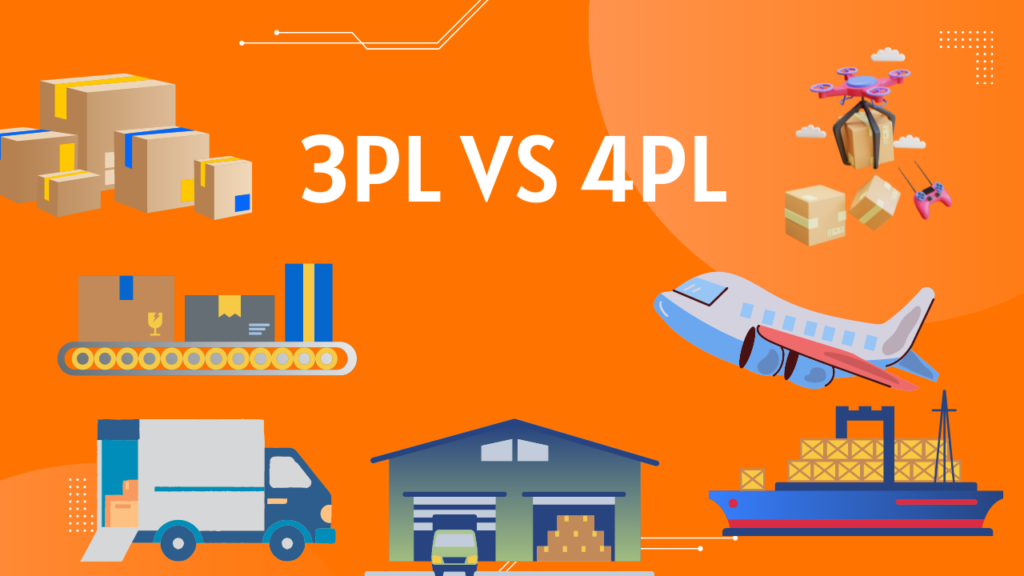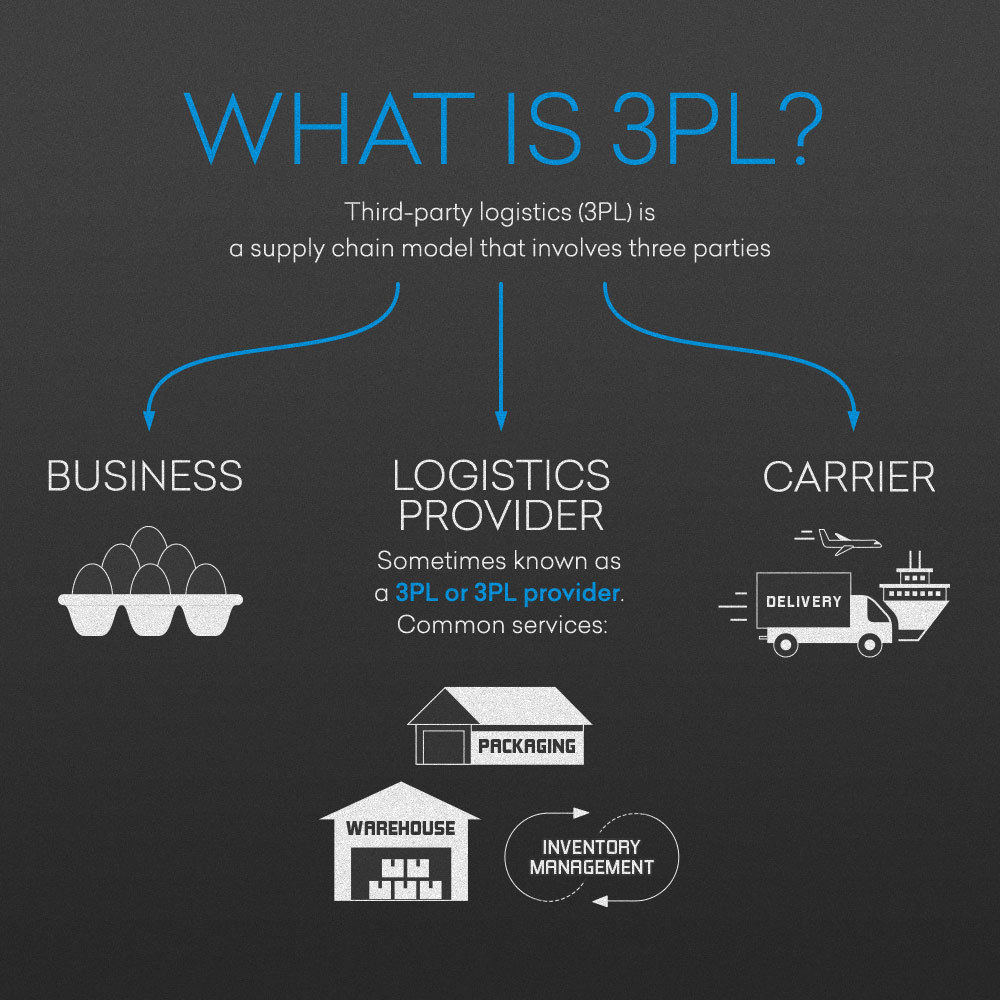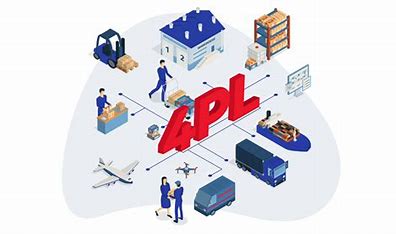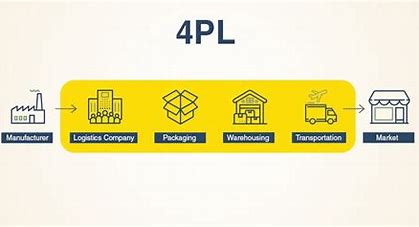Third-party logistics (3PL) and fourth-party logistics (4PL) are two terms that are frequently used in the logistics industry. While both are involved in the management of supply chains, they differ in their level of involvement and responsibilities. Understanding the difference between 3PL and 4PL is crucial for businesses that want to optimize their logistics operations.
3PL vs. 4PL: Understanding the Key Differences in Logistics Management

In today’s global economy, logistics management has become a critical aspect of operating a business. Companies need to ensure that their products can be shipped quickly and efficiently, while keeping costs low. Logistics management consists of different processes, including warehousing, transportation, and distribution management. Two important players in this field are 3PL and 4PL companies.
In this article, we will explore the key differences between 3PL and 4PL, their benefits and drawbacks, and how to choose the right one for your business. So if you’re interested in improving your logistics management, keep reading to learn everything you need to know about 3PL and 4PL.
What is 3PL?

A Third-Party Logistics (3PL) company is a service provider that offers logistics services to businesses. These companies are becoming increasingly popular as more and more businesses realize the benefits of outsourcing their logistics operations to specialized service providers.
3PL companies can handle one or more logistics functions, such as warehousing, transportation, or inventory management. By outsourcing these functions to a 3PL provider, businesses can focus on their core competencies and leave the logistics to the experts. This can result in significant cost savings and increased efficiency.
One of the key advantages of working with a 3PL company is their ability to offer customized solutions to meet their clients’ specific needs. This means that businesses can get exactly the level of service they require, without having to pay for unnecessary extras. For example, a company that only needs transportation services can work with a 3PL provider that specializes in transportation, rather than paying for a full suite of logistics services.
3PL companies work with a variety of industries, including retail, manufacturing, and healthcare. They have the expertise and resources to handle complex logistics challenges, such as managing a global supply chain or handling hazardous materials. By working with a 3PL provider, businesses can tap into this expertise and benefit from their specialized knowledge.
In summary, a 3PL company is a valuable partner for businesses looking to outsource their logistics operations. They offer a range of services, customized solutions, and specialized expertise that can help businesses save money, increase efficiency, and focus on their core competencies.
also checkout which software you should select with the help of 3PL Guide
What is 4PL?

A Fourth-Party Logistics (4PL) company is an advanced version of a 3PL company. A 4PL company acts as a supply chain integrator that manages and oversees all aspects of a company’s logistics operations. Instead of outsourcing logistics functions to different vendors, a 4PL company acts as a single point of contact for all logistics-related activities. They analyze, design, and implement complex supply chain solutions across multiple markets.
4PL companies are becoming increasingly popular as businesses seek to streamline their logistics operations. By outsourcing their logistics functions to a 4PL company, businesses can focus on their core competencies while leaving the logistics to the experts. This allows businesses to reduce costs, improve efficiency, and increase their competitiveness in the marketplace.
One of the key benefits of working with a 4PL company is the level of expertise they bring to the table. 4PL companies employ logistics professionals who have years of experience in the industry. They understand the complexities of supply chain management and are able to develop customized solutions that meet the unique needs of each client.
Another benefit of working with a 4PL company is the level of visibility they provide. 4PL companies use advanced technology to track shipments, monitor inventory levels, and analyze data. This allows businesses to have real-time visibility into their logistics operations, which can help them make more informed decisions and improve their overall supply chain performance.
Overall, 4PL companies are a valuable resource for businesses that want to improve their logistics operations. By working with a 4PL company, businesses can reduce costs, improve efficiency, and increase their competitiveness in the marketplace.
Evaluating the Pros and Cons of 3PL and 4PL
Logistics management plays a crucial role in the success of any business. It involves the planning, execution, and control of the movement of goods from the point of origin to the point of consumption. As companies grow and expand, managing logistics in-house can become a daunting task. This is where third-party logistics (3PL) and fourth-party logistics (4PL) providers come in.
Pros of 3PL
One of the primary advantages of working with a 3PL company is cost savings. Businesses can outsource non-core functions to a third-party provider, saving money on facilities, labor, and transportation. This is especially beneficial for small and medium-sized enterprises (SMEs) that may not have the resources to manage logistics in-house. 3PL companies can also offer network optimization, freight consolidation, and other value-added services that can improve efficiency and reduce costs. Additionally, 3PL providers have the expertise and experience to navigate complex regulations and customs procedures, reducing the risk of errors or penalties.
Another advantage of working with a 3PL provider is scalability. As a business grows, its logistics requirements may change. A 3PL provider can easily scale up or down to meet the business’s changing needs. This means that businesses can focus on their core competencies and leave the logistics to the experts.
Cons of 3PL
One of the main drawbacks of outsourcing logistics to a 3PL provider is loss of control. Businesses may need to rely on the third-party provider’s capabilities and systems, which can lead to miscommunication, delays, and reduced visibility. This can be a particular concern for businesses that operate in highly regulated industries or have complex supply chains.
Additionally, the 3PL company may not have the same level of stakeholder alignment and interest in the business’s success as in-house staff. This can lead to potential conflicts of interest or a lack of flexibility in meeting the company’s unique needs.
Another potential drawback of working with a 3PL provider is the risk of losing customer satisfaction. When outsourcing logistics functions, businesses run the risk of losing control over the quality of service provided to their customers. This can lead to dissatisfaction and ultimately, loss of customers.
Pros of 4PL
By working with a fourth-party logistics provider, companies can benefit from increased visibility, control, and coordination of their supply chain operations.
A 4PL company can act as a single source of accountability, providing end-to-end management of logistics functions and ensuring that all parties are aligned with the business’s goals. They can also provide advanced analytics and technology solutions to improve performance and optimize the supply chain.
Another advantage of working with a 4PL provider is the potential for innovation. 4PL providers are often at the forefront of logistics technology and can provide businesses with access to the latest tools and solutions. This can help businesses stay ahead of the competition and improve their overall performance.
Cons of 4PL
One of the key challenges of working with a 4PL provider is that it requires a high level of trust and coordination. Companies must be willing to give up some control and rely on the 4PL provider’s expertise and systems.
This can be difficult for businesses that are used to having complete control over their logistics functions. Additionally, the cost of working with a 4PL company may be higher than that of a 3PL provider, as they provide a more complex and integrated service.
Another potential drawback of working with a 4PL provider is the risk of misaligned goals. While a 4PL provider can act as a single source of accountability, they may not have the same level of stakeholder alignment as in-house staff. This can lead to conflicts of interest or a lack of flexibility in meeting the company’s unique needs.
Conclusion
Choosing between a 3PL and 4PL provider requires careful consideration of the business’s unique needs and goals. While 3PL providers offer cost savings and scalability, they may also lead to loss of control and customer satisfaction. 4PL providers offer increased visibility and coordination, as well as potential for innovation, but require a high level of trust and coordination. Ultimately, the decision should be based on the business’s priorities and long-term goals.
How the 4PL process works

The 4PL process is a complex and highly coordinated operation that requires a great deal of expertise and experience. The 4PL provider is responsible for overseeing the entire supply chain, from planning to execution, and ensuring that products are delivered on time and in the most cost-effective manner possible.
One of the key roles of the 4PL provider is to coordinate with suppliers, carriers, and other logistics providers to ensure that all aspects of the supply chain are working together seamlessly. This requires advanced analytics and technology solutions to optimize supply chain performance and manage risk. By leveraging the latest tools and techniques, the 4PL provider can identify potential issues before they become problems and take proactive steps to mitigate any risks.
Another important aspect of the 4PL process is the role of the provider as a single point of contact for all logistics-related activities. This means that the 4PL provider is responsible for managing all communications and interactions between the various parties involved in the supply chain, including suppliers, carriers, and customers. By acting as a central hub for all logistics-related activities, the 4PL provider can help to streamline the supply chain and improve overall efficiency.
In addition to managing day-to-day logistics operations, the 4PL provider is also responsible for ongoing evaluation and improvement of the supply chain. This involves regular monitoring of key performance indicators (KPIs) to identify areas for improvement and implementing changes to optimize performance. By continuously evaluating and refining the supply chain, the 4PL provider can help to ensure that it remains competitive and responsive to changing market conditions.
Ultimately, the success of the 4PL process depends on the expertise and experience of the provider. By working with a trusted and experienced 4PL provider, businesses can gain a competitive edge by optimizing their supply chain and improving overall efficiency and performance.
Which option is right for you?
The choice between a 3PL or 4PL provider ultimately depends on the unique needs of your business. Evaluating factors such as budget, internal resources, and the degree of visibility and control you want over your logistics operations is crucial. Companies that need more control and visibility might prefer a 4PL provider, while businesses looking for cost savings and expert logistics services could choose a 3PL company.
What is Magento POS?

Magento Point of Sale (POS) is an extension for Magento e-commerce software that allows businesses to process transactions in a brick-and-mortar retail environment. It offers features such as barcode scanning, inventory management, and order management, and provides a seamless integration between the online and offline shopping experiences. Magento POS can help businesses improve customer service, reduce transaction times, and increase revenue.
Conclusion
3PL and 4PL providers play an increasingly important role in logistics management. While both options have their pros and cons, understanding the unique needs of your business and evaluating each provider’s capabilities can help you choose the right solution. Companies that want to manage their entire supply chain might prefer a 4PL provider, while businesses looking to outsource specific logistics functions could benefit from a 3PL company. With the right logistics partner, businesses can optimize their supply chain operations, reduce costs, and improve customer service.
